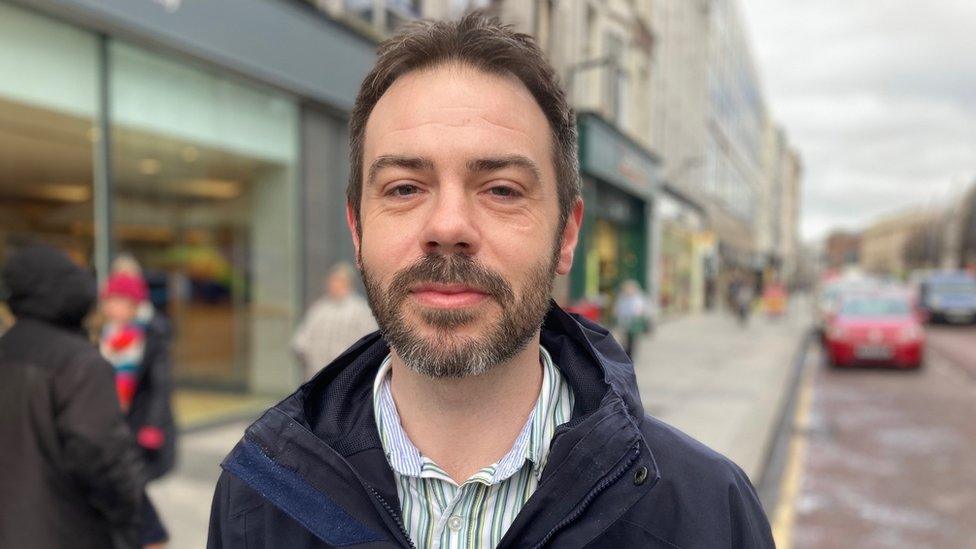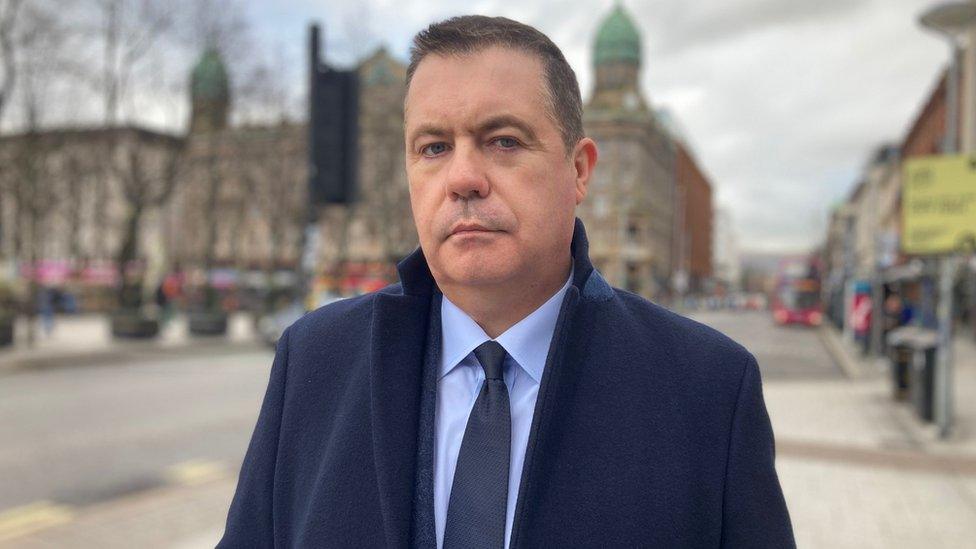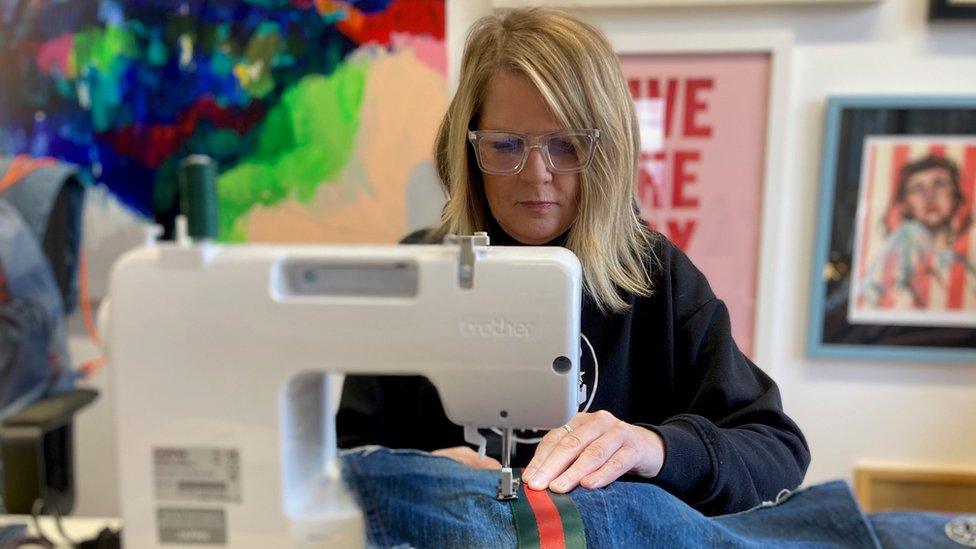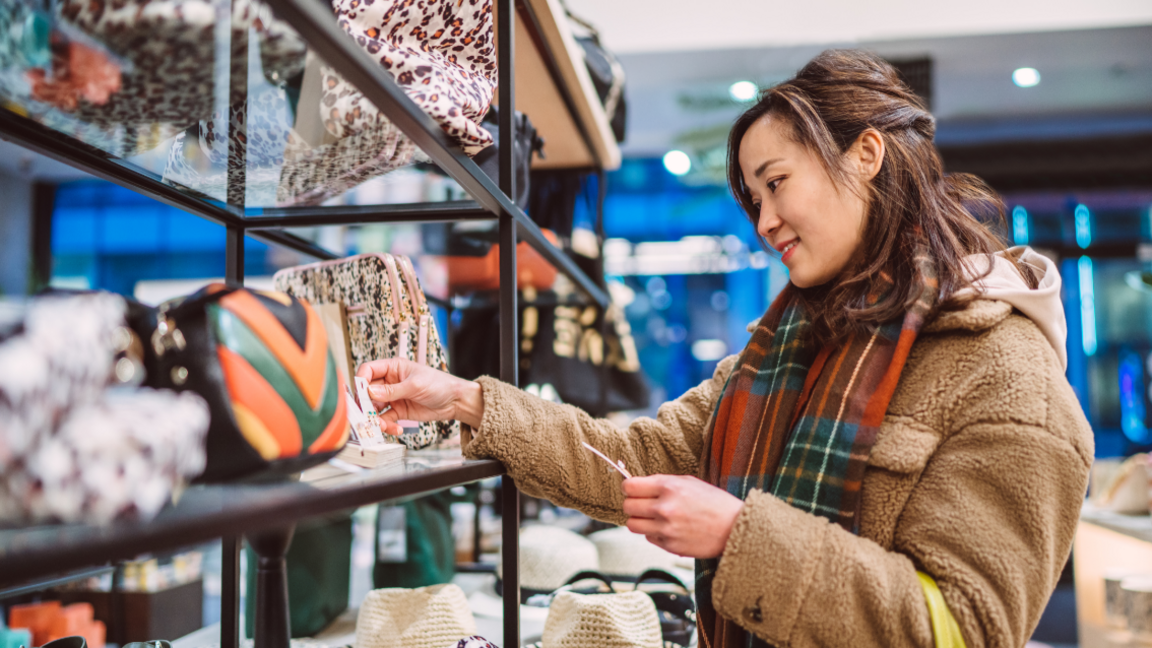Buy Nothing New- can the campaign work?
- Published
'We have a real problem with overconsumption'
Buy Nothing New Month - it sounds straightforward, doesn't it?
The campaign asks for you to think about your choices as a consumer - do you actually need to buy new, or can you reuse, repair or repurpose something you already own?
It began in Great Britain in January 2023 and a quick internet search doesn't reveal any backlash there.
But when it launched for the first time here in January 2024, retailers got angry.
A social post promoting the scheme in the Ards and North Down Borough Council area recently caught the ire of local business owners who felt it didn't help their prospects in what is traditionally a tough month.
That's perhaps not that surprising, given they've battled with the cost-of-living crisis - which is also a cost-of-doing-business crisis - for more than a year and endured a December disrupted by transport strikes.
But changing consumer choices is part of the road to addressing our carbon emissions and waste.
The balancing act
Northern Ireland generated almost 230,000 tonnes of household waste in the first three months of 2023.
That total includes items for recycling and for landfill, and is equivalent to more than 14,000 double decker buses.
If we reduce what we use, less demand will be created for the materials that go into those products, fewer things are likely to contribute to landfill or recycling and less stress will be placed on the planet.
But that's where the phrase "just transition" comes in - it refers to the need for nobody to be disadvantaged or left behind in the move towards greener, more planet-friendly living.
If we suddenly and sharply change our consumption of products, that could jeopardise jobs, threaten the economy and make it harder to sustain a transition to lower-emission lifestyles.
But we are already off-track on our net zero aims - so if we don't change our habits, we jeopardise the planet we live on.
It's a delicate balancing act - and one with different views, on all sides.
BBC News NI spoke to three people - a campaigner, the head of a retail organisation and an upcycler - about their views on how to strike the right balance.
The campaigner

Chris Gourley heads up the Buy Nothing New campaign in Northern Ireland
Chris Gourley, the waste and pollution solutions strategic lead at Keep Northern Ireland Beautiful, leads the campaign here and said it could lend itself to support local and small businesses.
He said overconsumption was a real problem and the solution was to move away from "make, take and dispose".
For him, the answer to a circular model: make, take, remake, repair. And he hopes, over time, this will lead to people wanting to recycle.
"There's pressures on consumers 12 months of the year to consume, consume, consume," he added.
"We want consumers to take a pause and look at how they consume - not stop consuming, but just look at some other way to consume that's more responsible and healthier for the environment."
The retail chief

Glyn Roberts, the head of Retail NI, represents a significant amount of traders and business owners
For Glyn Roberts, the chief executive of Retail NI, there's no doubt that traders have a part to play in reaching environmental targets such as reducing waste and hitting net zero.
He points out that Retail NI members are part of initiatives such as the carrier bag levy, which "brought over £14m into green and recyclable and sustainable projects", and offering refill options so people can bring stock up on household projects by filling their own containers.
"I think reduction has a role to play, but certainly not in encouraging consumers not to spend," he said.
Mr Roberts said he supported a "green New Deal mark II" but that it needed co-operation between environmental and business groups.
"It's only when we can co-design these efforts will we have that successful partnership approach and start to see the step-change and real change that we need to reach net zero."
The upcycler

Marie Nancarrow runs a business repurposing clothes
Marie Nancarrow, from Titanic Denim which repurposes denim and other discarded fabrics, said she's always been a charity shop browser.
"I was taking pre-loved jeans and pre-loved garments, cutting up the garments and patching the jeans. And then I discovered that what I was actually doing was sustainable design," she said.
The process creates bespoke pieces and helps the environment, she said - a win, win.
"I'm giving garments fabrics and materials a second life that they probably wouldn't have had before and would have ended up in landfill contributing to greenhouse gas emissions.
"I definitely believe there's a new movement, it's been happening over the last five years. That has been supported massively by social media.
"And, of course, that has given new ideas to people to be more conscious consumers, rather than to just buy constantly, and to look for other ways of buying clothes."
The Economist

Economist Ana Desmond said we need to move towards products that are more durable
Ana Desmond, a senior economist at Ulster University Economic Policy Centre, said we need to move to a "more circular economy where we reduce our consumption, reuse products, and then they're recycled as the final stage of the product".
"It's really difficult, especially when we live in a world of influencers and large marketing campaigns where we're encouraged to buy and consume more," she said.
"So what we need to do is shift not only the mindset of consumers but of employers and creators as well manufacturers, so we move towards products that are more durable, but we also then need to market that durability, reusing and repairing products so that we get further use out of them and convey the benefits of those to consumers as well.
"We're talking about maybe moving people from industries and productions that are less efficient towards those that are more sustainable."
Ms Desmond said that the transition wouldn't happen overnight.
"It's a long transition, but it's something that's becoming more and more necessary as we see climate change coming more to the forefront of people's agendas."
A final word
You may remember a campaign from the turn of the century: Reduce, Reuse, Recycle.
Recycling took off in a big way here - we now recycle 45.7% of our waste and some of it is recovered to be used for energy.
But a quarter still goes to landfill.
It's almost as though the first two steps of that slogan didn't really register.
Reduce was first for a reason - when you cut down on what you are consuming, you will reduce what goes to landfill or for recycling.
And recycling is the very final stage when an item's usefulness has been exhausted by reuse, repair and repurposing - finding new ways to support your local economy and protect the environment.
Related topics
- Published5 January 2024
